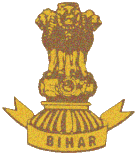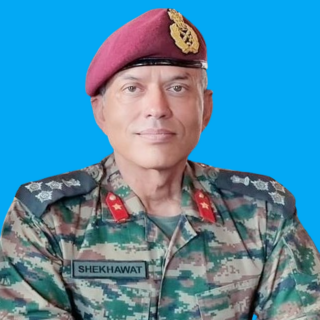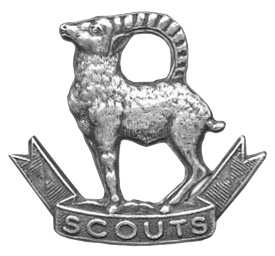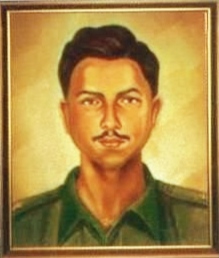
The 11 Gorkha Rifles is a Gorkha regiment of the Indian Army that was re-raised after independence. The regiment consists of primarily the Kirant Tribes Rai, Limbu, Yakkha, Sunuwar of Eastern Nepal, Darjeeling, Kalimpong, Dooars of West Bengal, Sikkim and other parts of Northeast India. Though it is considered to be the youngest of the Gorkha regiments its lineage is as long as those of the 7th Gurkha Rifles and 10th Gurkha Rifles.

The Jat Regiment also known as The Royal Jats is an infantry regiment of the Indian Army, of which it is one of the longest-serving and most decorated regiments. The regiment has won 19 Battle Honours between 1839 and 1947, and post-independence it has won Five Battle Honours, including 3 Ashok Chakra, 2 Victoria Cross, 2 George Cross, 13 Kirti Chakra, 8 Mahavir Chakra, 3 Military Medal, 53 Shaurya Chakras, 39 Vir Chakras and 343 Sena Medals. During its 200-year service history, the regiment has participated in various actions and operations in India and abroad, including the First and the Second World Wars. Numerous battalions of the Jat Regiment, including the 14th Murray's Jat Lancers, fought in the First World War.

The Kumaon Regiment is one of the oldest infantry regiments of the Indian Army. The regiment traces its origins to the 18th century and has fought in every major campaign of the British Indian Army and the Indian Army, including the two world wars, and is one of the highest decorated regiments of the Indian Army.

The Kirti Chakra is an Indian military decoration awarded for valour, courageous action or self-sacrifice away from the field of battle. It may be awarded to civilians as well as military personnel, including posthumous awards. It is the peacetime equivalent of the Maha Vir Chakra. It is second in order of precedence of peacetime gallantry awards, comes after Ashoka Chakra and before Shaurya Chakra. Before 1967, the award was known as the Ashoka Chakra, Class II.

Parachute Regiment (Special Forces), informally referred to as Para-Commandos, is a group of special forces battalions of the Parachute Regiment in the Indian Army. These units specialise in various roles including counter-insurgency, counter-terrorism, direct action, hostage rescue, special reconnaissance and unconventional warfare.

The Garhwal Rifles, are an infantry regiment of the Indian Army. It was originally raised in 1887 as the 39th (Garhwal) Regiment of the Bengal Army. It then became part of the British Indian Army, and after the Independence of India, it was incorporated into the Indian Army.

The Assam Regiment is an infantry regiment of the Indian Army. The regiment consists of 25 battalions: 15 regular battalions, 3 Rashtriya Rifles battalions, 5 Territorial Army battalions & 2 Arunachal Scouts battalions. It recruits exclusively from all the eight Northeastern states of India.

The Naga Regiment is an infantry regiment of the Indian Army. It is among the youngest regiments of the Indian Army - the first battalion was raised in Ranikhet, Uttarakhand in 1970. The regiment recruits mainly from Nagaland, in northeast India.

The Bihar Regiment is an Indian Army infantry regiment. It traces its origins back to the British Indian Army. The Bihar Regiment was formed in 1941 by regularising the 11th (Territorial) Battalion, the 19th Hyderabad Regiment, and raising new battalions. The Bihar Regimental Centre (BRC) is located at Danapur Cantonment, Patna, the second oldest cantonment of India. INS Vikramaditya, the Indian Navy's largest ship and one of its two aircraft carriers is affiliated to the Bihar Regiment, Indian Army's highly decorated and battle-hardened unit.

The National Socialist Council of Nagaland (NSCN) is a Naga militant and separatist group operating mainly in northeastern part of India, with minor activities in northwest Myanmar (Burma). The main aim of the organisation is allegedly to establish a sovereign Naga state, "Nagalim", which would consist of all the areas inhabited by Naga tribes in Northeast India and northwest Myanmar. India claims that China and Pakistan provide financial support and weaponry to the NSCN. Drug trafficking and extortion are believed to be other major sources of income for the NSCN.

The Officers Training Academy (OTA) is a training establishment of the Indian Army that trains officers for the Short Service Commission (SSC). The 49-week course at the OTA prepares graduates for all branches of the Army, except for the Army Medical Corps. Established in 1963, the first academy is located in Alandur, a southern neighbourhood of Chennai. OTA chennai has an impressive tally of gallantry award including 1 Param Vir Chakra, 8 Ashoka Chakra, 10 Maha Vir Chakra, 22 Kirti Chakra, 63 Vir Chakra, 119 Shaurya Chakra and 587 Sena Medal earned by the officers commissioned from this academy bears testimony to the Valour and dedication displayed by the Alumni. A new academy was set up at Gaya in 2011; but was given the go-ahead in December 2019 to be disbanded.

Brigadier Saurabh Singh Shekhawat, KC, SC, SM, VSM is a former Indian Army officer of the 21 Para (SF) and an avid mountaineer. He is one of Indian Army's most decorated officers, with one war-time gallantry award and two peace-time gallantry awards to his name.

Major Manish Pitambare KC was an Indian Army officer who posthumously received the Kirti Chakra, India's second highest peacetime gallantry decoration.

Colonel Neelakantan Jayachandran Nair, AC, KC (popularly known as "NJ") was a highly decorated officer of the Indian Army. On 20 December 1993, while heading an advance party of the battalion, his convoy was ambushed by Naga rebels. Nair personally led the attack to break the ambush and sacrificed his life defending his men. For this act of valour, he was conferred the Ashoka Chakra.

The Ladakh Scouts is a mountain infantry regiment of the Indian Army, nicknamed as the "Snow Warriors" or "Snow Leopards". The regiment specializes in cold-weather warfare and mountain warfare, long-range penetration, maneuver warfare, raiding with small unit tactics, and reconnaissance in difficult to reach and dangerous terrain. Its primary role is to guard India's borders in the high altitudes of the Union Territory of Ladakh.

Major Dinesh Raghu Raman, AC was an Indian military officer with the 19th Battalion of the Jat Regiment who was posthumously awarded India's highest peacetime military decoration Ashoka Chakra.
Captain Sunil Kumar Choudhary (1980–2008) was an officer in the Gorkha regiment of the Indian Army and belonged to the 7/11 Gorkha Rifles. Choudhary served for three years and was awarded with Kirti Chakra (posthumous) and Sena Medals.

Captain Eric James Tucker, AC was an Indian Army officer who was Posthumously awarded the highest peace time gallantry award, Ashok Chakra for an act of Gallantry in Nagaland.

Subedar Major and Honorary Captain Mahendra Singh, KC, SM is a decorated Indian Army Junior Commissioned Officer (JCO) of 9 Para SF. During an operation, he was paralysed on one side of his body.


















